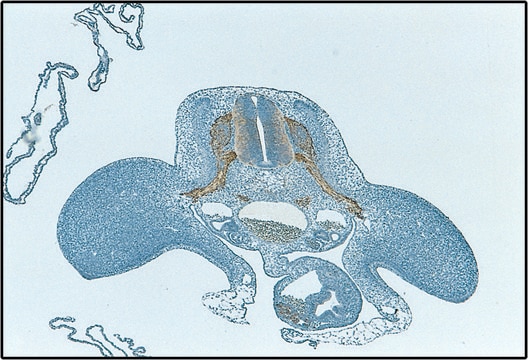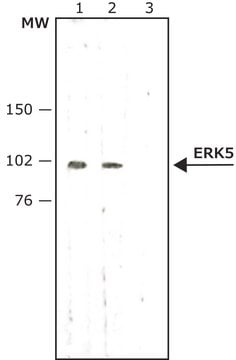C6680
Anti-HNK-1/N-CAM (CD57) antibody, Mouse monoclonal
clone VC1.1, purified from hybridoma cell culture
Synonyme(s) :
Monoclonal Anti-HNK-1, Hnk-1 Antibody, Hnk-1 Antibody - Monoclonal Anti-HNK-1/N-CAM (CD57) antibody produced in mouse, Anti-CD57, Anti-N-CAM
About This Item
Produits recommandés
Source biologique
mouse
Conjugué
unconjugated
Forme d'anticorps
purified from hybridoma cell culture
Type de produit anticorps
primary antibodies
Clone
VC1.1, monoclonal
Forme
buffered aqueous solution
Espèces réactives
mouse, rat, feline, human
Technique(s)
flow cytometry: 5 μL using 1 × 106 cells
immunohistochemistry (formalin-fixed, paraffin-embedded sections): suitable
Isotype
IgM
Numéro d'accès UniProt
Conditions d'expédition
wet ice
Température de stockage
2-8°C
Modification post-traductionnelle de la cible
unmodified
Informations sur le gène
human ... B3GAT1(27087)
mouse ... B3gat1(76898)
rat ... B3gat1(117108)
Vous recherchez des produits similaires ? Visite Guide de comparaison des produits
Description générale
Spécificité
5th Workshop: code no. NK 67
Immunogène
Application
- immunohistochemistry
- immunostaining and microscopy
- immunocytochemistry
- immunofluorescence
Actions biochimiques/physiologiques
Description de la cible
Forme physique
Clause de non-responsabilité
Vous ne trouvez pas le bon produit ?
Essayez notre Outil de sélection de produits.
Code de la classe de stockage
10 - Combustible liquids
Classe de danger pour l'eau (WGK)
nwg
Point d'éclair (°F)
Not applicable
Point d'éclair (°C)
Not applicable
Certificats d'analyse (COA)
Recherchez un Certificats d'analyse (COA) en saisissant le numéro de lot du produit. Les numéros de lot figurent sur l'étiquette du produit après les mots "Lot" ou "Batch".
Déjà en possession de ce produit ?
Retrouvez la documentation relative aux produits que vous avez récemment achetés dans la Bibliothèque de documents.
Notre équipe de scientifiques dispose d'une expérience dans tous les secteurs de la recherche, notamment en sciences de la vie, science des matériaux, synthèse chimique, chromatographie, analyse et dans de nombreux autres domaines..
Contacter notre Service technique








